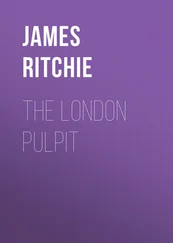James Ritchie - The Religious Life of London
Здесь есть возможность читать онлайн «James Ritchie - The Religious Life of London» — ознакомительный отрывок электронной книги совершенно бесплатно, а после прочтения отрывка купить полную версию. В некоторых случаях можно слушать аудио, скачать через торрент в формате fb2 и присутствует краткое содержание. Жанр: foreign_prose, на английском языке. Описание произведения, (предисловие) а так же отзывы посетителей доступны на портале библиотеки ЛибКат.
- Название:The Religious Life of London
- Автор:
- Жанр:
- Год:неизвестен
- ISBN:нет данных
- Рейтинг книги:3 / 5. Голосов: 1
-
Избранное:Добавить в избранное
- Отзывы:
-
Ваша оценка:
- 60
- 1
- 2
- 3
- 4
- 5
The Religious Life of London: краткое содержание, описание и аннотация
Предлагаем к чтению аннотацию, описание, краткое содержание или предисловие (зависит от того, что написал сам автор книги «The Religious Life of London»). Если вы не нашли необходимую информацию о книге — напишите в комментариях, мы постараемся отыскать её.
The Religious Life of London — читать онлайн ознакомительный отрывок
Ниже представлен текст книги, разбитый по страницам. Система сохранения места последней прочитанной страницы, позволяет с удобством читать онлайн бесплатно книгу «The Religious Life of London», без необходимости каждый раз заново искать на чём Вы остановились. Поставьте закладку, и сможете в любой момент перейти на страницу, на которой закончили чтение.
Интервал:
Закладка:
Very far back in English history we find the people whose descendants have taken possession of Houndsditch and all around, and turned it into a Jewish colony. More or less they have always been with us. In Anglo-Saxon times we seem to have had a fair sprinkling of them. After the Conquest they arrived here in great numbers. By William Rufus they were especially favoured, and Henry I. conferred on them a charter of privileges. They were enabled to claim in courts of law the repayment of any money lent by them as easily as Christians, and while the latter were forbidden to charge any interest on their loans, there was no restriction in this respect put upon the Jews. At this time, doubtless, they laid the foundation of their subsequent wealth. The sovereign rather encouraged them, as the richer they were the more gold could be forced from them – and with our earlier as well as with many of our later kings, gold was a commodity always in request. During the former part of the reign of King John (a. d. 1199–1216) they seemed to have gained the favour of that monarch, or at any rate obtained permission to exist, and trade and worship in this country on sufferance. Subsequently, however, they appear to have suffered much persecution, and were eventually banished from the country in 1291 (19 Edward I.), continuing in exile for 367 years. Menasseh Ben Israel, a Jewish rabbi of great learning in Amsterdam, petitioned the Protector Cromwell, in the year 1649, on behalf of his brethren, for a liberty which the Latin Secretary of the Lord Protector it is to be hoped would be foremost to advocate. During the interval the Jews lived secretly in England, but did not possess any “Jewries,” or publicly organized congregations. Ultimately they obtained permission to return, though the Commonwealth refused to give any formal sanction to their re-appearance, merely tacitly consenting to it. The people of England, says Rebecca in “Ivanhoe,” “are a fierce people, quarrelling ever with their neighbours or among themselves, and ready to plunge the sword into the bowels of each other. Such is no safe abode for the children of my people. Ephraim is an heartless dove. Issachar an overburdened drudge, which stoops between two burdens. Not in a land of war and blood, surrounded by hostile neighbours and distracted by internal factions, can Israel hope to rest during his wanderings.” There is, however, reason to suppose that nowhere, except for a short interval in Spain and always in Holland, have the Jews fared better than in this country. In our time they have been allowed to take their seats as M.P’s. We have seen a Prime Minister of England of Jewish origin. Need we say more? Jews are in all respects on an equality with Christians; in art, and literature, and science, and the acquirement of wealth, they have displayed a genius equal to our own. In practical piety – in the benevolence which teaches the rich to give of their goods to the poor, they are infinitely our superiors.
Truly, if we may judge by the aspect of the Hebrew race in Houndsditch and its neighbourhood, there is much room for charity. Just as the Irish Corporations were accustomed a few years ago to land a cargo of “the finest pisantry under the sun” on the Welsh coast to beg or steal, work or die, according to circumstances, so the chiefs of the Jews on the Continent ship the poor and helpless of their people here, and a heavy tax is thus enforced on the wealthier portions of the community. Then, again, the Jews have a great dislike to military service; and the conscription which is imposed in Prussia, Austria, Poland, and France, drives large numbers away from the land of their birth. Thus their number in London is greater than people imagine. Dr. Stallard places it as 55,000, but many Jews inform me that 100,000 is nearer the mark. One thing is certain: as soon as a synagogue is opened anywhere it is immediately crowded; and on special occasions, such as the days of penitence, fifteen regular and eighteen or twenty temporary synagogues are opened in different parts of London. Most of the foreign Jews when they arrive here are wretchedly poor and ignorant, but under any circumstances the Jew has to fight the battle of life under circumstances of peculiar difficulty, in consequence of the Mosaic law, which he is bound to obey, and which he does at a very heavy pecuniary sacrifice. It is almost impossible for a Jew to work with a Christian. He may not partake of his food. He may not work on Friday evening or on any part of Saturday, nor on the days set apart for the observance of the Jewish fasts and festivals. He is thus shut out from all employment in our factories, shipyards, engine works, or shops. If he seeks work at the docks he is driven away by the roughs. The “old clo’” business is being gradually taken away from him by the Irish, so his chief industrial occupations are tailoring, cigar-making, fish and fruit selling. The women are employed in tailoring and shirts making, in the manufacture of umbrellas and parasols, caps and slippers; latterly the supply of cheap picture frames has got into the hands of the Jews. I fancy none of these trades are very lucrative, yet the Jew is rarely a thief, never a drunkard, always attached to his family, and remarkable for his longevity. Suicide is rare, and murder never met with among the Jews. There are not twenty-five male Jewish convicts in all England, and for many years there has not been a Jewess in any convict establishment. Such is the charity of the wealthy that the poorest, who have resided here six months, are looked after. No Jew ever is permitted to die in a workhouse. In many of our hospitals there are wards for the Jews, supported by them. The Jewish Board of Guardians inquire into every case of distress, and relieve it. Yet so economically do they go to work that their expenditure in 1869 was, including loans, not quite 5000 l. , yet in that year the applications were 12,510.
But, in addition to their charities, the Jews are alive to the importance of promoting religion and education. The Jewish Association for the Diffusion of Religious Knowledge has now been in existence eleven years. Amongst its supporters are the Rothschilds, the Goldsmids, and the other wealthy Israelites whose charities are known all over England; but it needs, and let us add deserves, more efficient support. It has established a Sabbath school, where the present number of pupils is over 500, where instruction is given in reading, translation, and explanation of the Bible, translation of the prayers, religious and moral lessons, and Hebrew hymn-singing. It has established a synagogue in Union Hall, Artillery Lane, where lectures on the Sabbath are given. It has provided Scripture classes, and has published a series of Bible stories and Sabbath readings, of which half a million of copies have been delivered. The committee, when issuing the first number of their publications, stated that those papers would “have for their object to impress upon the Jewish mind proper notions of the principles and observances, spirit and mission, of Judaism, and by appeals to the reason rather than to sentiment, to develope and foster the most fervent conviction of the truths of our sacred religion.” In the way of Bible distribution the Society has especially been active; until recently it was comparatively a rare occurrence to find a Bible in the houses of the Jewish poor. Where it was found it was of course the authorized Anglican version, which, says the report, “however great its literary merit, must be admitted to be faulty, and to contain numerous mistranslations adverse to the spirit of our religion.” The version they circulated was Dr. Leeser’s, and they anticipate the day when no poor Jewish home wherein parent or child can read shall be without a Jewish version of the Holy Scriptures. Under the auspices of the committee, a reply to Bishop Colenso was published.
Читать дальшеИнтервал:
Закладка:
Похожие книги на «The Religious Life of London»
Представляем Вашему вниманию похожие книги на «The Religious Life of London» списком для выбора. Мы отобрали схожую по названию и смыслу литературу в надежде предоставить читателям больше вариантов отыскать новые, интересные, ещё непрочитанные произведения.
Обсуждение, отзывы о книге «The Religious Life of London» и просто собственные мнения читателей. Оставьте ваши комментарии, напишите, что Вы думаете о произведении, его смысле или главных героях. Укажите что конкретно понравилось, а что нет, и почему Вы так считаете.












